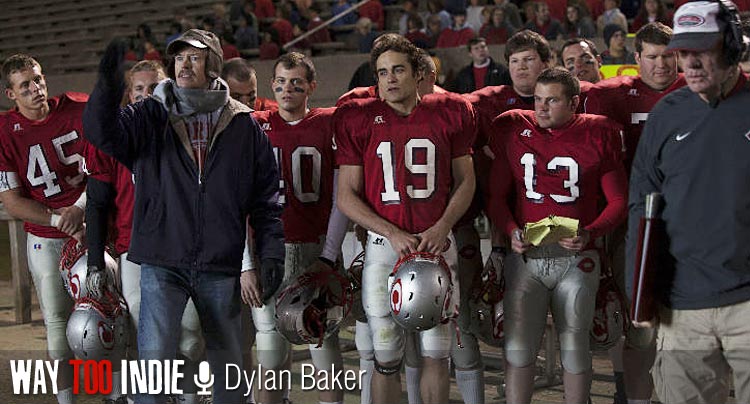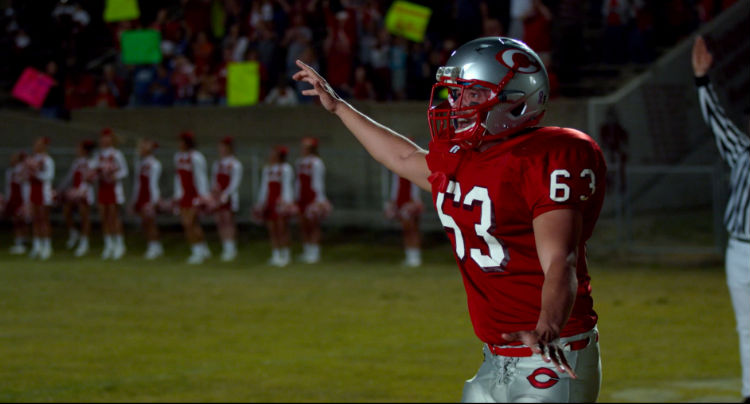Dylan Baker: If Anyone Can Find Comfort in This Film, I’ll Be Happy

In his debut feature, Dylan Baker (Spider-Man 2, Secretariat) pays homage to the miraculous story of Travis Freeman, a former high school football player from Corbin, Kentucky. Something of a town hero, Travis lost his sight completely at the height of his football career due to an infection of the optic nerve. With the support of his coach, teammates, and loved ones, Travis learned to maximize his other senses and worked his way back onto the football field, returning to the sport no one thought he’d ever play again. The film stars Mark Hapka as Travis Freeman and Baker as his father, Larry Freeman.
We caught up with Baker about how he found Travis’ story, his experience directing for the first time, how the film has touched people, portraying people of faith in a positive light, the logistical nightmare of night football, and more.
23 Blast is playing now in select cities and opens this Friday in the Bay Area

How did you find yourself in the director’s seat?
Dylan: It’s definitely something I’d thought about for a long time, but I figured I’d have to write a script from scratch and raise all that money, so once I got married and had a child I thought, oh forget this! [laughs] Three years ago, Toni Hoover, who was a high school friend of my wife, had moved back to this little town of Corbin, Kentucky. She came to me and my wife Becky and said she’d written this script about this boy she knew about and asked us to act in it. We thought, “That film will never get made, so that’s an easy yes!” When I read it, I was really excited by the story. The script had problems, so I started offering some suggestions and we worked on the script together. She asked me about some casting, and we worked on that, and all of a sudden she asked me to direct and this all happened after that.
What was your reaction to being asked to direct for the first time?
Dylan: My first reaction was the sane one: “No, absolutely not. This is not anything I should be doing. No. Stop.” But about three seconds later, I was like, “Wait a minute. When is anybody going to ask you that again?” After I thought about it and realized it was a good story, and Toni was a family friend, and she already had some money together, I called my good friend Gary Donatelli, and the three of us decided to produce the film together. We got some good people to join in and we went ahead and did it.
Travis’ story is truly inspiring; how have you seen it touch people in different ways?
Dylan: You do get a response from women who are so excited that this is a film their whole family can see. There are also people of faith who really react to the film well. They love the fact that it portrays people of faith positively, which is rare in films today. I have a good friend who works for our family, and her child was diagnosed with muscular dystrophy about 4 or 5 years ago. They’ve gone through hearing that he couldn’t do anything to the point now where he’s playing tennis with his father once a week. When they went to see the film, she told me it was uncanny. She said the scene where the doctor has to tell them what life is going to be like from now on is exactly what happened to them. A response like that makes you doubly happy that you were part of a film like this. If anyone can find comfort in this film I’ll be happy.
You mentioned something interesting there. I’m not a person of faith, but most of my family is and I love them dearly. I don’t like that people of faith are portrayed in a negative light so frequently.
Dylan: I think that in cinema we go through cycles of who we can say is the bad guy. Is it the Nazi? That was totally fine. For a while it was Japanese guys flying fighter planes. That was fine, too. Now it’s the Jihad, and for a while it’s also been people of faith. It will be people who decide to use their religion to screw up somebody’s life. It’s such a negative portrayal. When we set out to make this film, Travis and his parents were obviously people of very strong faith. I knew that however people saw this film, it would affect what they thought about this family. I worked really hard to try to bring that into the script, people who feel strongly enough about their connection with God that they wanted to inspire others. Travis Freeman is this guy who had that influence on people where he became their friend and got them to be believers. He wants to start a ministry, and I think his personality is strong enough. He’s able to look at the bright side of things.
In what capacity was Travis involved in the film?
Dylan: From the beginning Toni told them she was going to write this script and the Freemans said, “Go at it!” They gave her the rights and were happy to do it. We talked to the Freemans several times when we started, and we thought we wouldn’t bother them anymore. But the first or second day of shooting, they walked up to the set and asked if it was okay if they watched. I said, “Of course!” It might not have been every day, but it was close.
I asked Mary Freeman if she thought it’d be alright if we shot in the town church, and she went to find out. They were totally up for it. We filmed on a Saturday, and the parishioners and choir showed up, and it was really that kind of shoot where people fell over themselves to help us out. They housed some of the actors and crew in their homes because, as you know, an indie budget is not too big. [laughs]
What were some of the logistical hurdles you had to leap over?
Dylan: One of the biggest ones was that I kept turning to the screenwriter and saying, “Wait…it’s night football? Can’t it be played in the afternoon?!” He said, “No, in Kentucky we play at night!” All of a sudden, we had to schedule a week of all night shoots and do all of the stuff at the stadium. We had to get the fans in, get the football plays all ready…that was a logistical nightmare. But Gary Donatelli had worked on Monday Night Football, so he called up some of his buddies. We had four Red cameras shooting different angles, and all of the guys knew about football and the right football angles. What was hilarious was that they had these cameras, and they’d say, “Where’s the zoom?” I said, “What? This camera doesn’t have a zoom!” [laughs] There was a little learning curve there, but they all had a great time with a new vocabulary and a new way of shooting. That was interesting, I must say.
The other thing that was kinda fun was that we needed the Travis Freeman house. We looked at theirs, but it was really too small and would be too hard to shoot in. My line producer came to me and said, “Dylan, I’m looking to rent this house for the couple of months we’re here. I want you to take a look at it.” We ended up shooting that as the Freeman house. The production designer loved it because she got to fix up the whole house!
To wrap things up, why don’t you talk about your cast. You’ve got some great talent on the roster.
Dylan: I’ve worked with a lot of great people. The first people I called for the film said yes in most instances–Stephen Lang, Timothy Busfield…He’d directed a couple of episodes of Damages I did. I wrote him and asked if he wanted to be in the film, and within a minute he wrote back and said, “I’ll do it!” I did Secretariat with Fred Thompson, and he immediately said yes. I was shocked. For the mobility coach I had a real tough time–I turned over in bed and found this redhead and said, “Hey! Wanna play this part?” [laughs] My wife Becky played that part, and she knocked it out of the park. I knew she would.
